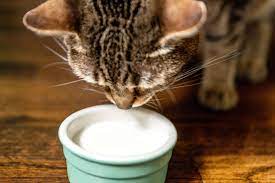
The image of a contented cat lapping up a saucer of milk is deeply ingrained in popular culture. From classic cartoons to vintage advertisements, this sight has perpetuated the belief that milk is a wholesome treat for our feline companions. However, the reality is more complex, as the question of whether cats should drink milk is far from a straightforward yes or no.
Historically, cats have been associated with milk consumption due to their role in barns and farms, where they were considered useful for pest control. Farmers would often offer milk to these cats as a sign of appreciation and to supplement their diet. Consequently, the notion of cats and milk became intertwined. Nonetheless, as our understanding of feline nutrition has evolved, it has become clear that milk is not an ideal beverage for most cats.
The primary concern with cats and milk lies in their digestive systems. Kittens are born with the ability to digest lactose, a sugar found in milk, as they rely on their mother's milk for nourishment. However, as cats mature into adulthood, many of them lose the enzyme lactase, which is essential for breaking down lactose. As a result, drinking milk can lead to digestive upset, including diarrhea and stomach discomfort.
While some adult cats may retain their lactase enzyme and can tolerate small amounts of milk, the majority are lactose intolerant. It's important for cat owners to recognize this and avoid offering milk as a treat. Instead, fresh, clean water should be the primary source of hydration for cats. Providing access to water at all times is crucial for maintaining their health and well-being.
Another reason to avoid giving milk to cats is its caloric content. Milk is relatively high in calories, and indulging in this treat regularly can lead to weight gain and obesity in cats. Obesity is a serious health issue in felines and can lead to various health problems, including diabetes, joint issues, and a reduced lifespan.
Moreover, while milk may seem like a nourishing option due to its association with kittens, it lacks essential nutrients that adult cats require. Cats are obligate carnivores, meaning their diet should primarily consist of animal-based proteins. Milk, being a non-animal product, does not fulfill their nutritional needs. A well-balanced, high-quality cat food is the best way to ensure that they receive the appropriate nutrients for their optimal health.
It is worth noting that there are specialized cat milk products available on the market. These products are designed to be lactose-free or have reduced lactose content, making them safer for adult cats to consume occasionally. However, even with these alternatives, moderation is key.
In conclusion, while the iconic image of cats and milk may be endearing, it is essential to recognize that milk is not an ideal beverage for most adult cats. Many cats are lactose intolerant, and offering them milk can lead to digestive issues. Moreover, milk is calorie-dense and lacking in essential nutrients, making it an inappropriate choice for regular consumption. Instead, fresh water and a nutritionally balanced diet that meets their specific needs as obligate carnivores are crucial for maintaining the health and well-being of our feline companions. As responsible cat owners, it is our duty to prioritize their dietary requirements and ensure they lead long, healthy lives.
